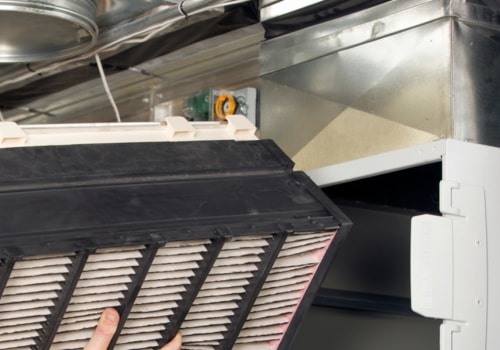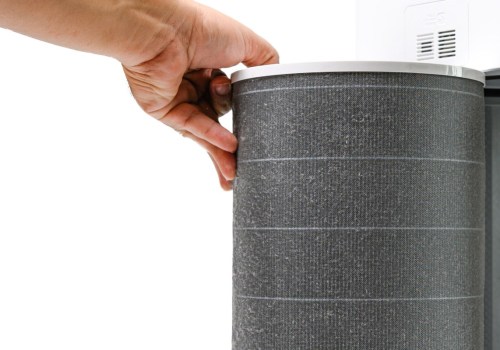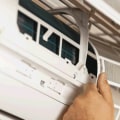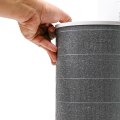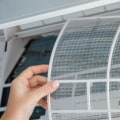How Often to Change Furnace Filter
Maintaining a well-functioning furnace is crucial for a comfortable and efficient home. One often overlooked aspect of furnace maintenance is the regular changing of the furnace filter. While it may seem like a simple task, the frequency at which a furnace filter needs to be changed can vary depending on various factors.
So, how often should you change your furnace filter? The answer to this question is more complex than one might think, but fear not, as we will delve into the details and provide you with the information you need to ensure your furnace operates at its best. Stay tuned to uncover the secrets behind optimal furnace filter replacement frequency.
The Importance of Regular Filter Changes
Regular filter changes are of utmost importance to ensure optimal performance and efficiency of your furnace system. Furnace filter maintenance is a crucial aspect of keeping your furnace running smoothly and effectively. Neglecting to change the furnace filter regularly can lead to a variety of issues and can significantly impact the overall performance of your heating system.
One of the primary benefits of clean air is improved indoor air quality. The furnace filter is responsible for trapping dust, dirt, allergens, and other airborne particles, preventing them from circulating throughout your home. By regularly changing the filter, you can ensure that these contaminants are effectively removed, providing you with cleaner and healthier air to breathe.
Another benefit of regular filter changes is improved energy efficiency. A dirty or clogged filter obstructs the airflow, forcing your furnace to work harder to maintain the desired temperature. This increased strain on the system can result in higher energy consumption and utility bills. By replacing the filter regularly, you can maintain proper airflow and enhance the overall efficiency of your furnace system.
Furthermore, regular filter changes can also prolong the lifespan of your furnace. A dirty filter can cause the system to overheat, leading to potential damage and costly repairs. By keeping the filter clean and replacing it as recommended, you can prevent unnecessary strain on the furnace and extend its longevity.
Understanding the Lifespan of Your Furnace Filter
The lifespan of your furnace filter can vary depending on several factors, including the type of filter, the level of air pollution in your area, and the frequency of furnace usage. Understanding the lifespan of your furnace filter is crucial for proper furnace filter maintenance and extending the filter's lifespan.
The type of filter you use plays a significant role in determining its lifespan. Disposable fiberglass filters typically have a shorter lifespan, lasting around one to three months. Pleated filters, on the other hand, have a longer lifespan, typically lasting three to six months. High-efficiency filters, such as HEPA filters, can last up to a year or even longer.
The level of air pollution in your area also affects the lifespan of your furnace filter. If you live in an area with high levels of air pollution, such as near a construction site or in a heavily industrialized area, your filter may need to be changed more frequently. This is because the filter will be exposed to higher levels of contaminants, reducing its effectiveness over time.
The frequency of furnace usage is another factor to consider. If you use your furnace year-round, the filter may need to be changed more frequently compared to someone who only uses their furnace during the winter months. Regularly inspecting your filter and checking for signs of dirt and debris accumulation can help you determine when it needs to be replaced.
To extend the lifespan of your furnace filter, it is essential to perform regular maintenance. This includes checking and replacing the filter as needed, vacuuming the area around the filter to remove any accumulated debris, and keeping the furnace and its surroundings clean. Additionally, scheduling annual professional maintenance for your furnace can ensure that it is running efficiently and that the filter is properly installed and functioning effectively. By taking these steps, you can maximize the lifespan of your furnace filter and ensure optimal performance from your heating system.
Factors That Determine Filter Change Frequency
When it comes to determining the frequency of furnace filter changes, there are several factors to consider. The type and quality of the filter play a significant role, as higher-quality filters tend to last longer. Additionally, the level of air pollution in the area and the occupancy rate of the household can also affect how often the filter needs to be changed.
Filter Type and Quality
Filter type and quality play a crucial role in determining how frequently furnace filters should be changed. Proper filter maintenance is essential for maintaining the efficiency and effectiveness of a furnace system. Different filter types can capture and trap airborne particles, such as dust, pollen, and pet dander. Low-quality filters may clog faster and require more frequent replacement. On the other hand, high-quality filters with higher MERV (Minimum Efficiency Reporting Value) ratings can capture smaller particles and provide better air filtration. Additionally, filter replacement tips should be followed to ensure optimal performance. It is recommended to check the filter regularly and replace it when it appears dirty or at least every 90 days. However, in households with pets, smokers, or individuals with allergies, more frequent filter changes may be necessary to maintain good indoor air quality.
Air Pollution Levels
Air pollution levels are a critical factor in determining the frequency at which furnace filters should be changed. High levels of air pollution can lead to the accumulation of dust, dirt, and other particles in your home's HVAC system. These particles can clog up the furnace filter more quickly, reducing its efficiency and compromising indoor air quality. Regularly changing the furnace filter is important to ensure that it can effectively capture and remove pollutants from the air. By doing so, you can prevent the circulation of harmful particles and improve the overall air quality in your home. Additionally, air pollution prevention methods, such as reducing the use of pollutants and implementing proper ventilation, can help minimize the health effects of air pollution and extend the lifespan of your furnace filter.
Household Occupancy Rate
One important factor that influences the frequency at which furnace filters should be changed is the occupancy rate of the household. The household size directly affects the amount of dust, dirt, and pollutants that accumulate in the air, which in turn affects the filter's lifespan. A larger household with more occupants will generate more airborne particles, leading to a faster clogging of the filter. On the other hand, a smaller household may not produce as much debris, resulting in the filter needing less frequent replacement. To ensure optimal filter performance, it is important to consider the household size when determining the filter change frequency. Additionally, regular filter maintenance tips such as vacuuming or brushing off the filter surface can help extend its lifespan and maintain the indoor air quality.
Recommended Frequency for Standard Filters
To maintain optimal indoor air quality, it is crucial to adhere to the recommended frequency for changing standard furnace filters. Regularly replacing your furnace filter is an essential part of filter maintenance. The frequency at which you should change your filter depends on various factors such as the type of filter, the level of pollutants in your home, and the manufacturer's recommendations. However, a general guideline is to change your standard furnace filter every 90 days. This timeframe ensures that your filter is effectively capturing and removing airborne particles, such as dust, pollen, pet dander, and mold spores, from your home's air.
Regularly changing your furnace filter not only improves indoor air quality but also helps maintain the efficiency and longevity of your HVAC system. A clogged or dirty filter can restrict airflow, causing your system to work harder, consume more energy, and potentially lead to costly repairs. By following the recommended frequency for filter changes, you can ensure that your system operates at peak performance while keeping your indoor air clean and healthy.
In addition to regular filter changes, it is also important to perform routine maintenance on your HVAC system. This includes cleaning the air vents, checking for leaks in the ductwork, and scheduling professional HVAC inspections. By implementing these filter maintenance tips and taking proper care of your HVAC system, you can enjoy improved air quality and a more efficient heating and cooling system.
Recommended Frequency for High-Efficiency Filters
Changing the focus to high-efficiency filters, it is important to note that the recommended frequency for replacement differs from that of standard filters. High-efficiency filters are designed to capture smaller particles and provide better air quality. They are more effective at trapping dust, pollen, pet dander, and other allergens, making them ideal for individuals with respiratory conditions or allergies. The benefits of using high-efficiency filters include improved indoor air quality, reduced allergens, and a cleaner living environment.
Unlike standard filters, high-efficiency filters have a longer lifespan and can typically last anywhere from three to six months before needing replacement. However, it is important to note that the frequency of replacement may vary depending on factors such as indoor air pollution levels, the number of occupants in the house, and the presence of pets.
Regular filter changes are crucial for maintaining the efficiency of high-efficiency filters. Over time, these filters can become clogged with debris, reducing their effectiveness and potentially causing strain on the furnace system. By replacing the filter at the recommended frequency, you can ensure optimal performance, energy efficiency, and cost savings in the long run.
Signs It's Time to Change Your Furnace Filter
As the furnace filter plays a crucial role in maintaining indoor air quality and efficient heating, it's important to recognize the signs that indicate it's time for a change. One of the key indicators of a clogged filter is decreased airflow throughout your home. This can lead to a decrease in heating efficiency and an increase in energy costs.
Clogged Filter Indicators
When a furnace filter becomes clogged, there are clear indicators that it is time to replace it. Ignoring a clogged filter can lead to various consequences. Firstly, reduced airflow can cause the furnace to work harder, leading to increased energy consumption and higher utility bills. Secondly, a clogged filter can result in poor indoor air quality, as it fails to efficiently trap dust, pollen, and other airborne particles. This can lead to respiratory issues, allergies, and aggravated asthma symptoms. Understanding the common causes of filter clogs can help homeowners identify when to replace the filter. Dust and debris accumulation, pet dander, and inadequate filter maintenance are some of the most frequent culprits. Regularly checking and changing the furnace filter is crucial in maintaining optimal indoor air quality and preventing potential issues.
Decreased Airflow Efficiency
Ignoring a clogged furnace filter can result in decreased airflow efficiency, leading to potential consequences such as increased energy consumption, higher utility bills, and compromised indoor air quality. When a furnace filter becomes clogged with dirt, dust, and debris, it restricts the airflow that is necessary for the proper functioning of the heating, ventilation, and air conditioning (HVAC) system. As a result, the system has to work harder to maintain the desired temperature, leading to increased energy consumption and higher utility bills. Moreover, the decreased airflow can also cause the HVAC system to overheat, potentially resulting in damage to its components. To avoid these issues, it is crucial to know how often to change the furnace filter and maintain the optimal airflow efficiency of the system.
Increased Heating Costs
Regularly changing your furnace filter is essential to avoid increased heating costs. When your furnace filter becomes clogged with dirt, dust, and debris, it restricts the airflow and puts a strain on your heating system. As a result, your furnace has to work harder to maintain the desired temperature, leading to increased energy consumption and higher heating costs. A dirty filter not only affects your wallet but also hurts indoor air quality. When the filter is clogged, it is less effective at trapping pollutants, allergens, and other particles, allowing them to circulate throughout your home. This can lead to respiratory issues, allergies, and a generally uncomfortable environment. By regularly changing your furnace filter, you can ensure efficient heating, lower energy bills, and healthier indoor air quality.
How to Properly Change Your Furnace Filter
To ensure efficient and clean air circulation in your home, it is essential to properly change your furnace filter. Proper filter installation and avoiding common filter replacement mistakes are crucial steps in maintaining the performance of your HVAC system.
When it comes to installing a new filter, make sure to follow the manufacturer's instructions. Start by turning off the furnace and locating the filter compartment. Remove the old filter and check its size and type, as these are important factors in selecting the correct replacement. Once you have the appropriate filter, insert it into the compartment, making sure it fits snugly and securely.
One common mistake people make is forgetting to change the filter regularly. It is recommended to replace the filter every one to three months, depending on factors such as the air quality in your area, the number of occupants in your home, and whether you have pets. Neglecting regular filter replacement can lead to clogged filters, reduced airflow, and increased strain on your heating system.
Another common mistake is using the wrong type of filter. Filters have different levels of efficiency, ranging from basic fiberglass filters to high-efficiency pleated filters. Using a filter with too high of an efficiency rating can restrict airflow, while using a filter with too low of a rating may not effectively capture particles and contaminants.
Frequently Asked Questions
Can I Reuse My Furnace Filter After Cleaning It?
While it is possible to reuse a furnace filter after cleaning, there are pros and cons to consider. Cleaning can help extend the filter's lifespan and save money, but it may affect its effectiveness and air quality. Regular replacement is recommended for optimal performance.
How Do I Know if I Have a Standard Filter or a High-Efficiency Filter?
Determining the type of filter in your furnace is essential for proper maintenance. To identify if you have a standard or high-efficiency filter, consult the manufacturer's specifications or contact a professional HVAC technician for assistance.
Can I Use a Higher Merv-Rated Filter Than Recommended for My Furnace?
Using a higher MERV-rated filter than recommended for your furnace can provide better air quality by capturing smaller particles. However, it may also reduce airflow, causing strain on your HVAC system. Regular filter changes are important to maintain optimal performance.
What Are the Potential Consequences of Not Changing My Furnace Filter Regularly?
Neglecting to change a furnace filter regularly can result in reduced indoor air quality, increased energy consumption, decreased efficiency, and potential damage to the furnace system. Regular filter changes are crucial to maintain a healthy and efficient heating system.
Are There Any Special Considerations for Changing the Furnace Filter in a Multi-Story Home?
Special considerations should be taken when changing the furnace filter in a multi-story home. Factors such as the size of the home, the number of filters needed, and the accessibility of the filter should be assessed to ensure proper maintenance and efficient functioning of the heating system.
Filterbuy HVAC Solutions - West Palm Beach FL
1655 Palm Beach Lakes Blvd ste 1005, West Palm Beach, FL 33401
(561) 448-3760
https://maps.app.goo.gl/xyqVoYNrXPyjRwVy6
